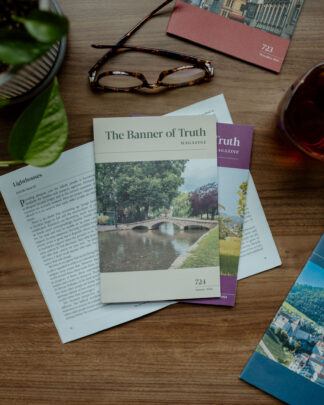A Bridge to Inner Peace
This is the first in a series of ‘taster’ articles to mark the sixtieth anniversary of the Puritan Paperbacks series. Here, the Trust’s Editorial Director provides a flavour of the inaugural title of the series, appearing in 1961.
First published in 1649, William Bridge’s thirteen sermons on Psalm 42:11, entitled A Lifting Up for the Downcast, are a perfect example of Puritan preaching—expository, doctrinal, experiential, and practical. The text—‘Why art thou cast down, O my soul? and why art thou disquieted within me? hope thou in God: for I shall yet praise him, who is the health of my countenance, and my God’—is ‘opened up,’ and out of it Bridge draws his ‘doctrine’ or main points of teaching:
‘First, That there is an inward peace and quietude of soul, which the saints and people of God ordinarily are endued with. This is implied.
Secondly, It is possible that this peace may be interrupted, and God’s people may be much discouraged, cast down and disquieted.
Thirdly, That the saints and people of God have no reason for their discouragements whatever their condition may be.’
Bridge’s doctrine is drawn out of the verse in his first three sermons or chapters of the book. But it would be wrong to think that this skilful pastor presents us with three unrelenting doctrinal essays. He frequently intersperses his teaching with objections and questions an imaginary reader or listener might raise against the points being made. And so throughout the first three foundational chapters (and, indeed, the rest of the book) he patiently answers objections and clears the way for the practical application of the truths expounded.
The third point being established—‘that the people of God have no reason for their discouragements whatever their condition may be’—he goes on to demonstrate and prove what at first sight might seem like such a sweeping and startling statement, by applying the truth to eight areas of Christian experience. From the word of God he provides a ‘lifting up’ for those suffering from great sins, weak grace, miscarriage of duties, lack of assurance, temptation, desertion, affliction, unserviceableness, and discouragements caused by the condition itself.
In the thirteenth and final sermon Bridge ties his whole treatise together by showing to sinner and saint alike that the only and effective ‘cure of discouragements’ is ‘by faith in Jesus Christ.’
There are a couple of things that left an impression on me as I recently reread Bridge’s classic work. The first is the author’s amazing knowledge and grasp of Scripture. Of course, he was not alone among the Puritans in this regard. They were all ‘men of the Book’ who demonstrated an intimate familiarity with all parts of Scripture. This is particularly noticeable in the way Bridge uses an almost encyclopaedic knowledge of the Bible to illustrate his teaching. Little known and almost incidental details are pulled out of Scripture (the Old Testament in particular) to perfectly illustrate a point. Take for example an illustration in chapter five where he argues that the Christian who is weak in grace ‘is more easily quenched in regard of his comforts than the strong Christian is. A strong Christian will use that for his edification which seems to be against him; but the weak Christian will use that against himself which is in truth for him.’ He then picks two examples from Scripture: the Syro-Phoenician woman who encountered Jesus’ stern words with faith (Matt. 15:27) and Manoah who said to his wife after he had seen the angel of the Lord: ‘We shall surely die, because we have seen God’ (Judg. 13:22). Bridge concludes: ‘Thus he used that against himself which was intended for his good, as his wife truly interpreted the thing, verse 23: why so, but because he was weak in faith.’
Secondly, Bridge’s work is an ‘argument’—a well-reasoned treatment of a not uncommon spiritual problem which affects believers in every generation. The verse on which the treatise is based is an argument in itself—David is reasoning with himself, ‘Why art thou downcast, O my soul?’ etc. Bridge takes up the argument and uses it as a method to persuade his readers of the great point of his treatise, ‘that the saints and people of God have no reason for their discouragements whatever their condition may be.’ The key word here is ‘reason’. He is not saying that a believer cannot have their ‘peace interrupted,’ or that God’s people will never be ‘much discouraged, cast down and disquieted.’ Far from it!—as he demonstrates in his second sermon. But here is the great thing: when the problem is analysed in the light of Scripture, when the truths of the gospel are opened and applied, when we see the full provision that God the Father has made for us sinners in the gospel of his Son Jesus Christ, then, with William Bridge, we shall see that there is ‘no reason’ for our discouragement.
Notes

June 2021
Magazine Issue 693
Description
Table of Contents Learning from Lamentations — Ian Hamilton Iain H. Murray at 90: A Birthday Tribute — Andrew Atherstone A Fresh Look at the Basics — Geoff Thomas My Five ‘Must Read’ Books — Tom Richwine Feedback & Comment Goodness and God — Peter Barnes The Fear of Death Overcome: Encouragement from John Flavel […]
Originally printed in the June 2021 Banner of Truth Magazine.
Latest Articles
A Call to Preserve Evening Worship Services July 26, 2024
The following was published as ‘Preserve Evening Worship Services!’ in the October 2007 edition of the Banner of Truth Magazine (Issue 529). It was written by Michael G. Brown, who at the time was pastor of Christ United Reformed Church, Santee, CA. He currently pastors Chiesa Riformata Filadelfia in Milan, Italy. ‘Why do you go […]
How to Read a Soul-Improving Book June 20, 2024
The following, which appeared in Issues 611–612 of the Banner of Truth Magazine (Aug–Sep 2014) is from John Angell James, The Anxious Inquirer After Salvation Directed and Encouraged*. We are grateful to Mr Martyn Jolly for bringing this extract to our attention and supplying the text. It may seem strange to some persons, that I […]

